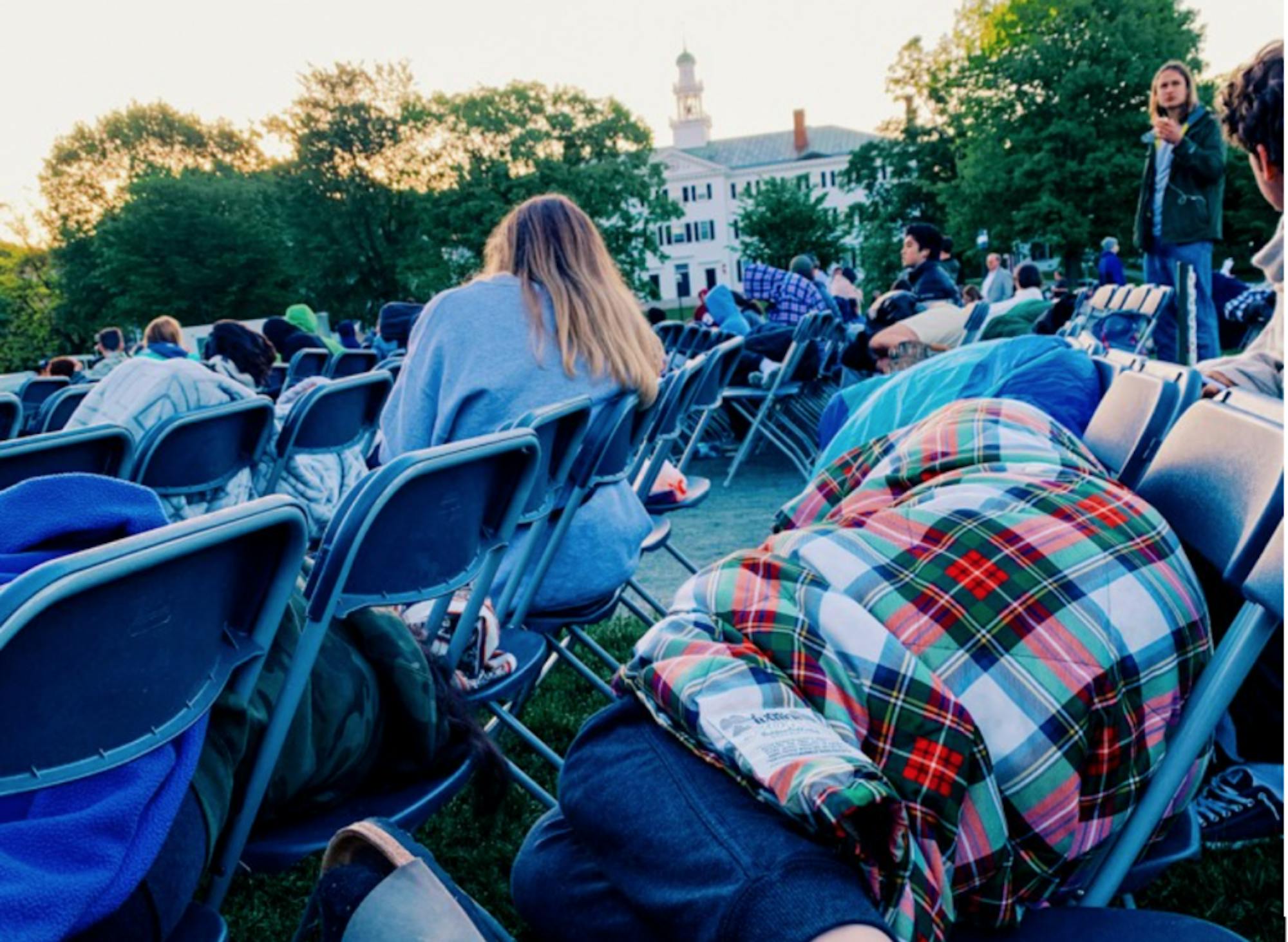On Sunday, June 9, students from the class of 2019 graduated from the College with family and friends looking on from the audience. The process of securing these seats is one that many families dedicate much money and time to ensure they are able to see the graduates receive their diplomas.
Save for a few sections reserved for accessible seating and special guests, all commencement seating is handled on a first come, first served basis, according to executive director for conferences and events Ernest Kiefer. Seating opens four-and-a-half hours before the ceremony’s 9:30 a.m. start time, and many guests, rather than arriving on the Green before dawn themselves, turn to paid seat savers to secure an optimal section or view. Kiefer noted that the practice has been common for at least 18 years which is how long he has worked at the College’s conferences and events office.
This early morning practice is unique to Dartmouth’s graduation ceremony. For example, Yale University opens gates at 8:00 a.m. with the ceremony starting at 10:30 a.m. Similarly, Harvard University allows guests to enter at 6:45 a.m. at the earliest. Princeton University limits the number of guests each student can bring to five.
Steffi Colao ’19 was one of the many seniors to pay for saved seats this year. While her family did not desire any particular seats, she said a long commute to the ceremony made reserved seats an attractive choice.
“My parents were staying an hour and a half away from Dartmouth,” Colao said. “I personally don’t love the whole idea [of seat saving] as a concept, but, for them, they already had to wake up at 5 o’clock in the morning to leave in time and get there with traffic and parking.”
Not wanting to push up an already-early start to the important day, Colao started looking for seat savers through what she said were the usual channels: clubs, teams, and other student organizations she was a member of. She said she was willing to pay savers $50 per seat.
Giavanna LaGamba ’21 said she was hired as a seat saver through her sorority, Kappa Delta. A member of the organization shared a spreadsheet to facilitate arrangements between graduating seniors who needed seats saved and underclassmen willing to save them, LaGamba said. She was matched with an older Kappa Delta sister and said she would accept a $150 payment to save the maximum-allowed three seats, though she heard $70 to $100 per seat was a common rate.
Jennifer Qian ’22, another seat saver at this year’s ceremony, was also paid $50 per seat, which she said she believed was roughly the “going rate” for the service. Already planning to participate in a Dartmouth Outing Club trip ending back on campus the day before the ceremony, Qian said she decided it would be natural to stay for graduation the next day to say goodbye to some of her older friends.
Both LaGamba and Qian arrived around 3:45 a.m. and said the gates opened slightly before 5:00 a.m. According to LaGamba, seat savers poured onto the Green, even knocking over the temporary barrier.
“People asked me if I hopped the fence,” Qian said. “I was like ‘Well, the fence was down, so I stepped over it.’”
Once inside, the two both recounted watching videos on their phones, chatting with other seat savers and napping. LaGamba said she was warned by fellow seat savers not to indicate to Safety and Security officers that she was being paid to save seats, as that was grounds for dismissal. Kiefer confirmed, however, that while the College does not condone paid seat saving, no such policy is in place.
“What we do police, what we do keep an eye out for, is a person that has no connection to any families who goes to the Green, saves three seats, and then goes around saying, ‘I have seats here; come buy these seats,” Kiefer said.
Kiefer said that the conferences and events office does not have plans to restrict seat saving in the future because the private arrangements are out of the office’s control.
“I don’t want to call it the ‘black market,’ but it’s all happening outside of the College’s oversight,” Kiefer said. “Our office, representing commencement, we don’t condone it.”
Despite this, Kiefer maintains that paying seat savers isn’t necessary.
“There are plenty of seats on the Green, and families shouldn’t waste their money,” he said. “All the seats on the Green have a great view of the stage and the jumbotron and it’s just a waste of money to do seat saving.”
Besides being a potential waste of money, Colao voiced concerns about the message that the popular practice sends.
“Dartmouth has such a problem with socioeconomic stratification,” she said. “I think seat saving is just another way that, at your last event of being on this campus, a moment that should be celebrating everybody’s successes still becomes a show of who can pay for what and whose experience is better based on the money that they have.”
Eileen (Eily) Brady is a '21 from Chicago who studies government and romance languages. Eily loves travel, politics, iced tea and her dogs, Mac and Charlie. She is thrilled to be reporting the news for The Dartmouth.


